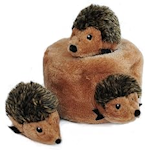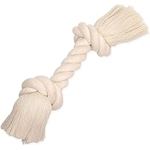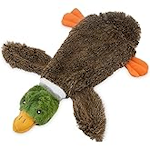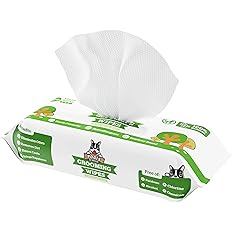Pug Dog Breed
A Guide To The Popular Toy Pugs
When it comes to the origins of the Pug dog breed, most of the available information is mainly based on speculation.
That being said, the majority of historians will agree that toy Pugs are a very old breed, generally believed to have originated in China, some time prior to 400 BC.
During this period the Pugs are said to have enjoyed a high status as companion pets in the palaces of Emperors. There seems to also be a consensus among experts that they were revered pets in the Tibetan monasteries.
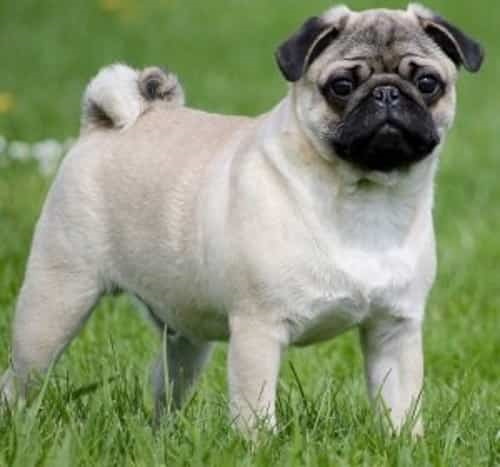
Later History of the Pug Dog Breed
Later history reveals that the Pug gained much popularity in Europe where this small dog breed was often to be found in royal
households - although it was also treasured by people from all walks of life. They were especially favored by the Dutch
who, it is said, trusted them to watch over their children.
One Pug is credited with saving the life
of Prince William of Orange by alerting him to the advancing Spaniards in 1572 at Hermingny, France. Much later, when William III became
king of England, the favored Pugs crossed the channel with him, beginning their popularity in Great Britain.
During the 19th century, the British brought several more of these dogs back to England after they
had successfully taken over the Chinese Imperial Palace. Subsequently, the Duke and Duchess of Windsor
became very fond of the breed and owned twelve of them during the course of their lifetime.
Among the popular small dog breeds, the Pug has been described by owners as charming, yet strong-willed. Their charm has led them to become somewhat famous in the movie industry.
Appearance
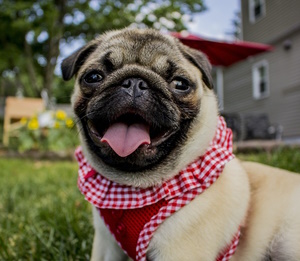
Height: 10-11 inches
Weight: 14-18 pounds
Coat Colors: include apricot,
black and silver fawn.
Breed Group: Toy
Life Span: 13-15 years
The Pug dog breed is a small version of the mastiff, which makes him look quite robust for his small size. His overall appearance is that of a charming, chubby, and squarely built dog.
Health Notes
Pugs are lovable and endearing dogs, but they have some specific health considerations due to their distinctive physical features. Here are health issues to be aware of that may affect your Pug during its lifetime.
- Brachycephalic Airway Syndrome: Pugs' short noses can lead to breathing difficulties. This syndrome may result in snoring, snorting, and labored breathing, especially in hot or humid conditions.
- Obesity: Pugs have a strong appetite and can quickly become overweight, which worsens other health issues like joint problems and respiratory challenges.
- Eye Problems: With their protruding eyes, pugs are susceptible to conditions like corneal ulcers, dry eye, and progressive retinal atrophy (PRA), which may cause vision loss.
- Skin Issues: The skin folds can trap moisture and bacteria, leading to infections and irritations if not cleaned properly.
- Hip Dysplasia: This hereditary condition affects the hip joint, leading to arthritis and mobility issues as pugs age.
- Epilepsy: Pugs can experience seizures, which might need to be managed with medication.
Pet parents may expect their Pug to live up to 15 years with the benefit of a high quality diet, moderate exercise and regular oversight from their veterinarian. Individual lifespans can differ based on genetics and overall care.
Preventive Care:
- Monitoring weight and identifying any potential health issues early on.
- A well-balanced diet tailored to their needs can prevent obesity.
- Good dental health is essential, as pugs are prone to periodontal disease; regular brushing and dental check-ups are recommended.
Although pugs face various health challenges, responsible breeding, proper care, and regular veterinary visits can help them enjoy happy and healthy lives. It's always best to consult a veterinarian for personalized advice tailored to your pug's specific needs.
Grooming the Pug
The coat is smooth and soft, but one surprising feature of the Pug that you should really take to heart, is that they are known to be notorious shedders.
Owners need to brush them quite a bit - daily even, and vacuum up the fur balls often. One grooming tool that is a life-saver and that pet owners swear by is the FurMinator. It handles shedding like no other tool and keeps the Pug's coat under control for a longer period of time.
Other important grooming areas are:
- the facial folds - dare we say wrinkles
- and the ears
With such a short face
doing all the sniffing around that dog's do, a lot of undesirable
junk and slobber gets into those folds around the muzzle and above the eyes. But if you keep a supply of
natural grooming wipes at hand, it's easy to clean the facial area quickly and avoid bacterial issues.
Pugs are prone to ear problems such as infections and mite invasions. As such, regular cleaning with an ear wash
is important.
Many dogs are not very cooperative when it comes to nail clipping
- Pugs are even more so, plus their nails grow quickly. Rising to this
challenge, some owners have found it very helpful to use an Elizabethan collar
for the job because it makes
the dog much calmer.
Another less traumatic approach for the dog, and you, is
a dremel nail filer especially for dogs with black nails that make
it harder to see the quick.
Characteristics And Traits
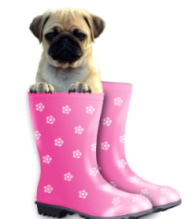 Pug in Boots
Pug in BootsOne of the most debatable and frequently asked questions about the pug dog breed is: Do Pug's snore? In regard to this, most owners report that the little cuties "do" indeed snore, so if this bothers you - wrong dog!
The Pug's character is best described as playful, charming, clownish and somewhat "naughty". They are quite intelligent, love to be around people and are very affectionate.
They do seem to enjoy the attention of being dressed up and in general their owners seem to like decking them out in fancy coats and sweaters.
While the Pug temperament is often described as stubborn, they are never aggressive or pugnacious! However, the stubborn streak can make potty training your dog harder.
Among the small breeds, the Pug dog breed is one of the most popular
companion dogs and considered to be easy to obedience train once you
take the lead. Since Pugs are food driven, homemade treats can be helpful with training - as long as you keep an eye on their waistline.
Another useful trait around the household, is their reputation for being a fairly good watchdog. To clarify "fairly good", they will bark to alert you of a possible intruder, while at the same time not being nuisance barkers.
How Active Are Pugs?
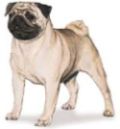
These little dogs do not need a lot of exercise - in fact, care should be taken not to over exercise them in warm weather because they really cannot tolerate a lot of heat.
Some pugs are prone to breathing problems related to the brachycephalic syndrome.
However, under normal
conditions, the Pug dog breed is pretty tough and short walks will be enjoyed - not to mention it will help keep their weight in check!
Ideal Space For A Pug
This breed can adapt to city or suburban life, house or apartment and a
yard is not a necessity.
Aside from their love of play, they are not especially active dogs around the house. That being said, a daily walk is good for social and mental stability.
Are Pugs Good With Children?
The Pug has a very good reputation with children, being very loving and patient. It goes without saying that children should be taught how to interact with pets and respect their small size in this case.
That being said, any dog can be unpredictable and it is always
recommended that activities between pets and children be supervised by
an adult.
Suitability For Sedentary Families?
Almost a match made in Heaven! This breed makes an excellent companion for seniors or a more sedentary family.
Exercise demands are modest and he
seems to be extra sensitive toward the more needy.
What Can You Share About The Pug Dog Breed?
Is The Pug Your Favorite Dog Breed?
Do you have a beloved Pug dog? Have you
had one in the past? Or do you just love the breed?
Please take a minute to tell our visitors why you love the Pug and even how you enjoy spoiling them!
Go here to tell
what you know about this fascinating little dog and get your own Pug page!
Before You Go...
If you like the content of this page, as well as others on my site, please give it some love by clicking on the heart in the lower right hand corner. This helps me keep providing enjoyable and useful content.
Thank you.
Essential Pug Dog Toys
